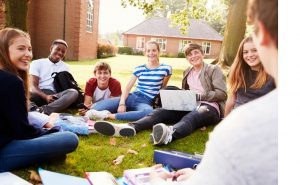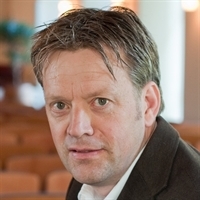Education for a sustainable world
On 24 April Wageningen University & Research (WUR) will launch a new school project: the Wageningen Borlaug Youth Institute. The goal of this project is to inspire young people to work on the challenge of supplying the world with responsible, healthy diets. It thereby further shapes a broader challenge: more attention for sustainability in education.
The Borlaug Youth Institute of Wageningen University & Research offers guidance and inspiration for their projects (profile workpiece, masterpiece, excellence project). If a student can develop their idea into advice, they stand a chance to present this at the World Food Prize ceremony in the United States (a kind of Nobel Prize in the field of agriculture and food) and meet people from the highest international echelons of science and business.
Agronomist Norman Borlaug received the Nobel Peace Prize in 1970. He became known as the man who saved a billion people from starvation and stimulated young people to engage in the topic of food quality and quantity, the President of the Executive Board of WUR, Louise Fresco, says in a short video about the project.
Other skills
The project fits in an important process to help young people to develop skills needed for building a sustainable future. Wageningen also conducts research regarding:
“Learning for sustainability is about education where students learn to think critically, are engaged with their environment, have space to discover and learn through immersing themselves in local and global issues regarding health, climate, poverty, inequality, energy and biodiversity”
Sustainability is so much more than solar panels. It is about developing a different mindset and learning to look at sustainability in a new way. In addition to substantive knowledge, this also requires the ability to:
- deal with complexity, diversity, confusion and uncertainty.
- take someone else’s perspective.
- make ethical and moral considerations and critically evaluate the values that influence these trade-offs.
- utilising systems thinking and bridging the gap between thinking and doing.
The future
“At its core, it is about good education, not a separate subject”, explains Arjen Wals. He is a professor of social learning and sustainable development in Wageningen and focuses more on sustainability competencies. He considers sustainability as a catalyst for educational reform. “The question is whether we encourage one-sided values in education. Developing yourself, preparing you for a career, taking good care of yourself, being competitive and engaging in lifelong learning to provide flexibility in the labour market; it is rather obvious that schools help pupils with this, but this is a very economic outlook on the role of education. Sustainability has to do with the future, with empathy and care. The values side is also very important. The Netherlands may be seen as an innovative country economically, but the question is whether we are on the right track in the forefront or in a dead-end street. As I recently heard someone say, we need to consider if we are just rearranging the furniture on the Titanic or if we are preventing the ship from sinking.”
 Students have to learn to ask the essential questions, in line with the Sustainable Development Goals (in Dutch), and must be given the space think for themselves. This is how they develop other insights and realise that in different places and different times, different solutions may be applicable. Learning for sustainability is done best by working with concrete sustainability concepts in their own living environment.
Students have to learn to ask the essential questions, in line with the Sustainable Development Goals (in Dutch), and must be given the space think for themselves. This is how they develop other insights and realise that in different places and different times, different solutions may be applicable. Learning for sustainability is done best by working with concrete sustainability concepts in their own living environment.
Happy Meal workshop
One example is the workshop “Happy Meal” that WUR has developed for secondary schools. In this workshop, students are put to work in groups with one of the ingredients: the bun, the fries, the burger patty, the soft drink or the toy. They then consider two questions: what is it and where does it come from? When they share the information they have learned, they discover not only how many transport kilometres are required for the meal and that the working conditions of the people who make the toys far from here are often not good, but also that the children only play with the toy very briefly and that the plastic toys quickly become waste. Then the third question follows: Can you create a real Happy Meal that will make everyone happy? Then they critically begin to design, try, taste and calculate what such a Happy Meal 2.0 is going to cost.
“This class changes the perspective of young people and allows for consciousness”, says Wals. But it does even more; it offers action perspective. “It is very important that they discover that there are alternatives, because it prevents a sense of powerlessness and shows them that change is possible.” They learn from each other (social learning) and engage in discovery learning, for which there is usually little room in school. “That’s not surprising, because the examinations do not focus on these types of questions”, says Wals.
“Education is not just there to serve the economy but should contribute to ecological basic education and the ability to leave a more sustainable world”
Forty youth organisations have already called for a greater focus on sustainability in education a few years ago at the House of Representatives, because they felt that education does not prepare students sufficiently to be able to successfully work on a liveable planet and a green economy for now and later and in different places. With success: The majority of the House of Representatives signed the Treaty in sustainability education (in Dutch) and, at the end of 2014, the House of Representatives also supported the Ouwehand motion (in Dutch).
Education
Wageningen is educating its own students in this, not only by encouraging multidisciplinary work, but also by offering the course Environmental Education for Sustainable Living (for the 25th year). In June the newer Teaching and Learning for Sustainable Development course will begin. In the Education minor of WUR, in which students are prepared for work in education and other forms of information transfer and teaching, attention is also paid to this subject. In addition, WUR is collaborating on the Groene Kompas (Green Compass) for vocational education.
Wals also notes interest in this innovation at schools. “Schools are looking for new ways to make a difference for their students and to teach meaningfully. Unfortunately, policy is still hopelessly behind.”
More to read and watch
- News story about the Wageningen Borlaug Youth Institute
- Video: Arjen Wals about his work and motivation
- Video: Louise Fresco (President of the Executive Board of WUR) calls on teachers to encourage their students
- Report: Learning for sustainable development, exploring the Learnscape (in Dutch)
- Book Social Learning towards a Sustainable World (open access)
- Article about concretely engaging with sustainability: preventing litter (in Dutch)
- Scientific article (pdf) about the importance of responsible research and innovation (IRR)
- Obtaining assistance for pupils and teachers: info.youthinstitute@wur.nl
- Dutch version of this blog: Onderwijs voor een duurzamere wereld


Good initiative, however emphasis should be given to the continent such as Africa , Asia where many brilliant minds lack conducive environment to maximize their potentials
Waww! This sounds fantastic!
I wonder if I could work this project with my secondary pupils, Happy Meal,perhaps.Keep me informed,please.
*Work on this project.
Congratulations for striving hard towards the betterment of below poverty society. Hundred years of your experience and society directected approaches placed you as the World first Agricultural University. May the Nature provide you the strength to improve SDG in poor countries
A group of us in Atlanta, GA, USA have created a non-profit with international mindedness and environmental stewardship as the non-profit’s purpose. We follow with interest Wageningen. We share Ola’s comments above.
If i can be of some use to the Team for supply of Healthy Diet for the supporting Health education in India. I will ready to do my share of work.
Indeed – no sustainable solutions without the full and fair inclusion of theAfrican continent or of any continent for that matter – what we need to move away from is what some call ‘systemic global dysfunciton’- this will require a departure from conventional ways of thinking – some of which rooted in colonial ways of thinking – that seek to maximize profit and efficiency without considering planetary boundaries, equitable sharing and long term perspectives. There are some interesting niches in Africa, Asia and Latin America where communities are exploring alternative ways of teaching, learning and community engagement (see for instance: http://www.transgressivelearning.org)
Most appreciated – thank you. We have a long way to go still but as Miles Horton and Paulo Freire wrote once: “we make the road by walking”.
Dear Maria Trucco, if you would like to be informed about happy meal you can send an email to info.youthinstitute@wur.nl.